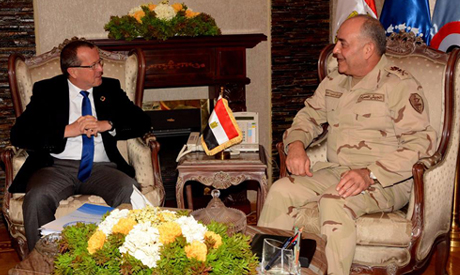
Egypt's chief of staff of the armed forces Lt. Gen. Mahmoud Hegazy meets Head of the UN Support Mission in Libya Martin Kobler in Cairo on Saturday, January 14, 2017. (Photo Courtesy of Army Spokesman Facebook Page)
Egypt's chief of staff of the armed forces Mahmoud Hegazy discussed with Head of the UN Support Mission in Libya Martin Kobler the mechanisms to reach consensus between the numerous rival factions in the war-torn country through the agreed upon declaration of principles, the army spokesman said on Saturday.
On 13 December, Libyan officials and representatives from the country's various political factions gathered in Cairo, issuing a declaration of principles, along with five proposed amendments to the UN-brokered Skhirat agreement of 2015, which aims at ending Libya's civil war.
In a statement on its official page, the spokesman said the two counterparts discussed the latest developments in the Libyan talks.
Kobler, on his part, hailed Egypt's recent efforts "to achieve a convergence of views between the Libyan parties as it constitutes an important step to reach a consensus guaranteeing the restoration of security and stability in Libya."
Egypt's President Abdel-Fattah El-Sisi discussed on Thursday in Cairo the latest developments in Libya with the chairman of the Libyan Presidential Council Fayaz Al-Sarraj.
Egypt's president also received in late 2016 Libya’s House of Representative speaker Aguila Saleh, who conveyed his intention to call on his country's parliament to consider the proposed changes in the Skhirat agreement.
The Skhirat agreement, which was reached in Morocco in 2015, mandated the reaching of a peaceful transition of power in Libya and the establishment of a national unity government.
There are currently five proposed amendments in the agreement, including a change in the makeup of the Libyan national dialogue committee to better achieve balance the country's rival factions, a change in the duties of the army commander, and measures to maintain the independence of the armed forces and insulate it from involvement in political disputes.
Libya currently has two parliaments and two rival governments, effectively dividing the country into east and west.
Short link: